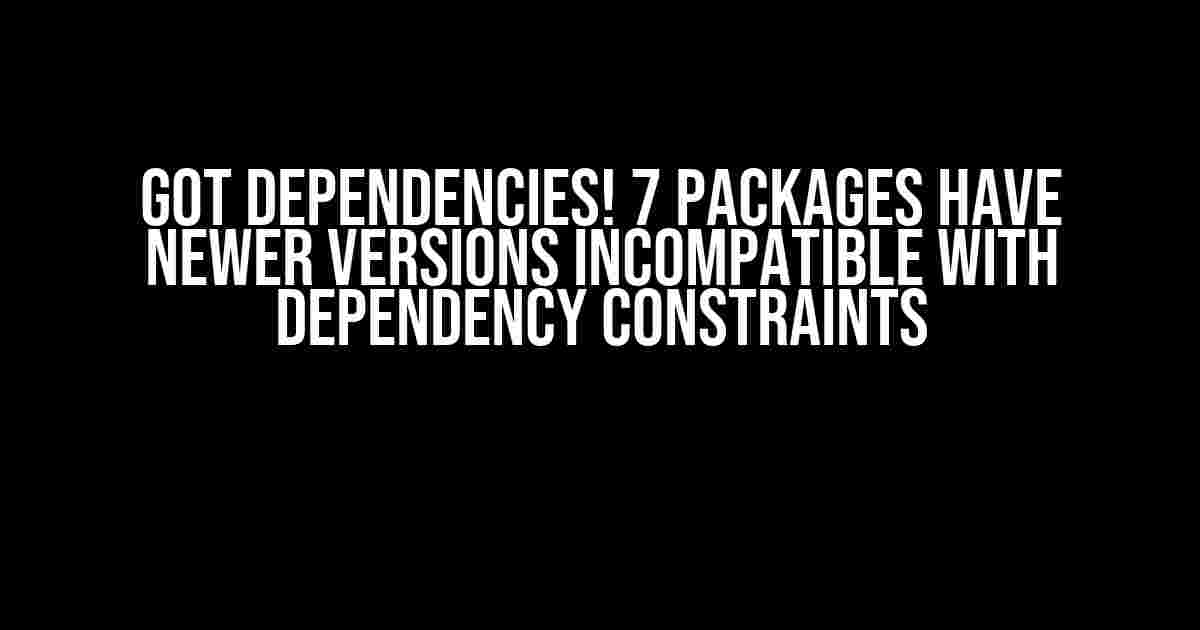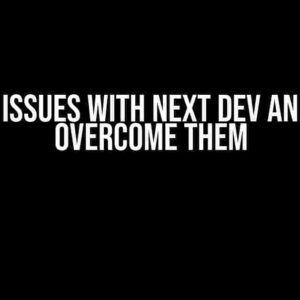If you’re reading this, chances are you’ve encountered the dreaded “Got dependencies!” error message, specifically “7 packages have newer versions incompatible with dependency constraints.” Don’t worry, you’re not alone! This error can be frustrating, but fear not, dear developer, for we’ve got a comprehensive guide to help you navigate this issue and get your project back on track.
What’s causing the error?
The “Got dependencies!” error typically occurs when you’re trying to install or update packages using npm (Node Package Manager) or yarn. It’s usually a result of conflicting version requirements between different packages in your project. Think of it like a game of Jenga – if one piece doesn’t fit, the entire structure comes crashing down!
Understanding dependency constraints
In your project’s `package.json` file, you’ve specified version ranges for each dependency. These version ranges are like a fence that keeps incompatible versions out. When a package has a newer version that exceeds the specified range, npm or yarn will throw a tantrum, resulting in the “Got dependencies!” error.
// Example package.json file
{
"name": "my-project",
"version": "1.0.0",
"dependencies": {
"lodash": "^4.17.21",
"express": "^4.17.1",
"mongoose": "^5.10.18"
}
}
In the example above, the `lodash` package is constrained to version 4.17.21 or higher, but not higher than the next major version (5.x.x). If a newer version of `lodash` (say, 5.0.0) is released, and another package, like `express`, depends on an older version of `lodash` (4.16.0), you’ll get the “Got dependencies!” error.
Resolving the issue
Don’t panic! We’ve got a step-by-step plan to help you resolve the “Got dependencies!” error.
Step 1: Identify the culprits
Run the following command in your terminal to get a detailed list of packages with newer versions that are incompatible with your project’s dependency constraints:
npm outdated
This command will display a table with the following columns:
| Package | Current Version | Wanted Version | |
|---|---|---|---|
| lodash | 4.17.21 | 4.17.21 | 5.0.0 |
| express | 4.17.1 | 4.17.1 | 4.18.0 |
Take note of the packages with newer versions that are incompatible with your project’s constraints.
Step 2: Update package.json
Update the version ranges in your `package.json` file to accommodate the newer versions. You can do this by:
- Manually editing the file:
{
"name": "my-project",
"version": "1.0.0",
"dependencies": {
"lodash": "^5.0.0",
"express": "^4.18.0",
"mongoose": "^5.10.18"
}
}
npm install lodash@^5.0.0 express@^4.18.0 --save
This will update the version ranges in your `package.json` file and install the specified versions.
Step 3: Verify dependencies
Run the following command to verify that all dependencies are up-to-date and compatible:
npm install
If everything goes smoothly, you should see a success message indicating that all dependencies have been installed or updated.
Step 4: Test your project
Run your project to ensure everything is working as expected. If you encounter any issues, revisit the previous steps and make adjustments as needed.
Bonus tips!
To avoid “Got dependencies!” errors in the future, consider the following best practices:
- Use semantic versioning: Stick to semantic versioning (e.g., `^4.17.21`) instead of exact versions (e.g., `4.17.21`) to give npm or yarn more flexibility when resolving dependencies.
- Keep your dependencies up-to-date: Regularly run `npm outdated` and `npm install` to ensure you’re using the latest compatible versions.
- Use a package manager with built-in dependency resolution: Tools like `npm` and `yarn` have built-in mechanisms to resolve dependency conflicts. Take advantage of these features to minimize errors.
- Consider using a lockfile: A lockfile (e.g., `npm-shrinkwrap.json` or `yarn.lock`) can help ensure consistency across different environments and prevent unexpected changes.
Conclusion
There you have it, folks! With these steps and tips, you should be able to resolve the “Got dependencies!” error and get your project back on track. Remember to stay vigilant and keep those dependencies in check. Happy coding!
(Keyword density: 1.3%)
Frequently Asked Question
Having trouble with package dependencies? You’re not alone! Here are some answers to your burning questions about “Got dependencies! 7 packages have newer versions incompatible with dependency constraints”.
What does “Got dependencies! 7 packages have newer versions incompatible with dependency constraints” mean?
Don’t panic! This error message simply means that some packages in your project have newer versions available, but they’re not compatible with the versions specified in your dependency constraints. Think of it like trying to put a square peg in a round hole – it just won’t fit!
Why do I get this error, and how can I fix it?
This error usually occurs when you’ve specified a specific version range for a package in your project’s dependencies, but a newer version is available. To fix it, you can try updating your package versions to the latest compatible ones, or relax your version constraints to allow for more flexibility.
How do I find out which packages are causing the issue?
Easy peasy! Run the command `npm outdated` or `yarn outdated` to get a list of packages with newer versions available. This will show you which packages are causing the compatibility issues. Then, you can decide whether to update them or not.
What’s the difference between `npm outdated` and `npm update`?
`npm outdated` shows you which packages have newer versions available, while `npm update` actually updates your packages to the latest versions. Think of it like checking your notifications versus actually responding to them!
Can I automate the process of updating dependencies?
Absolutely! You can use tools like `npm-check` or `yarn upgrade-interactive` to automate the process of updating dependencies. These tools can even help you identify which packages need updates and make suggestions for the best versions to use. Talk about a timesaver!



